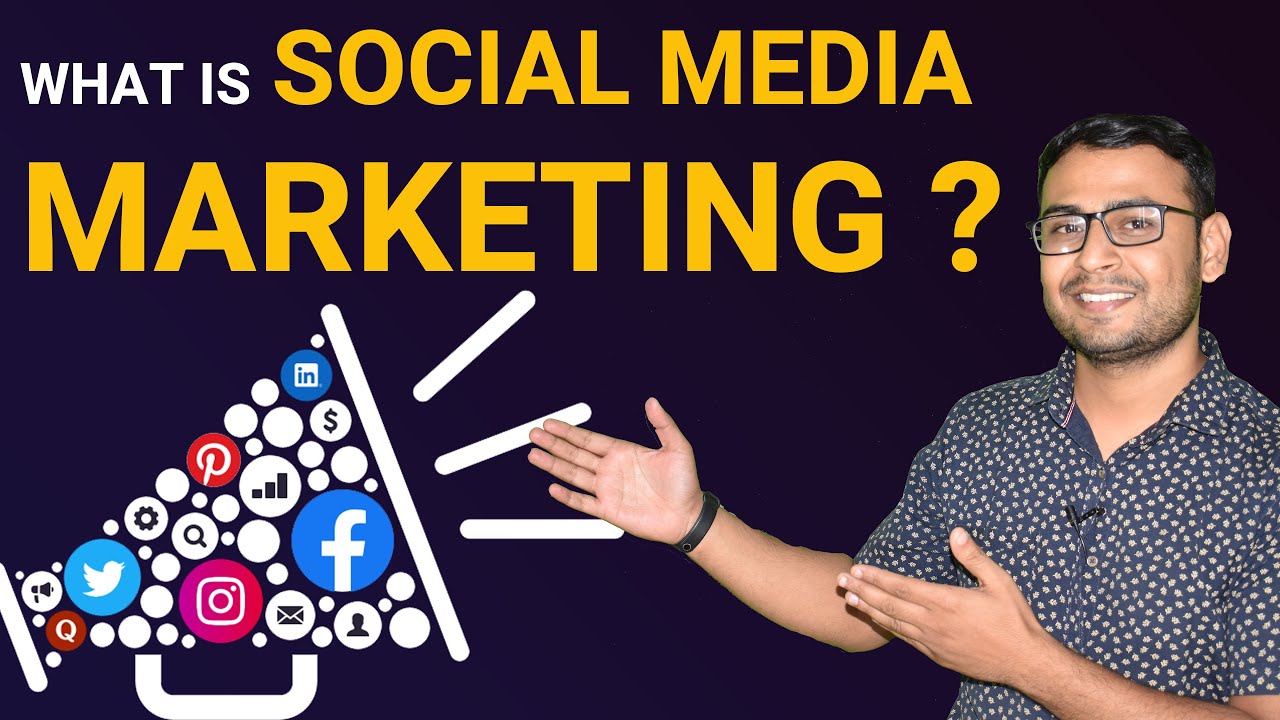In an ever-evolving digital landscape, social mediahas emerged as a dominant force that profoundly impacts how businesses connect with their audience. For local businesses, the potential of social media marketingis nothing short of transformative.
Leveraging the power of popular platforms such as Facebook, Instagram, Twitter, and others, social media marketing for local businesscan now reach and engage with their target customers in ways that were once unimaginable. By harnessing the vast reach, cost-effectiveness, and interactive nature of social media, local businesses can catapult their brand visibility, foster customer loyalty, and ultimately flourish in their communities and beyond.
What Is Social Media Marketing?

What is Social Media Marketing | Social Media Marketing for beginners | social media marketing
Social Media Marketing is a digital marketing strategy that involves the use of various social media platforms to promote products, services, or brands. It utilizes the power of social media to connect with the target audience, engage with potential customers, and build a strong online presence.
The primary goal of social media marketing is to create compelling contentthat resonates with the audience, encourages interactions, and ultimately drives desired actions such as website visits, lead generation, or sales. Social media marketing encompasses a wide range of activities, including:
- Content Creation-Businesses create and share various types of content, such as posts, images, videos, infographics, and articles, to engage their audience and communicate their brand message.
- Audience Engagement -Engaging with followers through comments, messages, and discussions fosters a sense of community and builds relationships with customers.
- Social Advertising -Paid advertisements are used to promote content or specific offerings to a targeted audience, maximizing the reach and visibility of marketing campaigns.
- Influencer Marketing-Collaborating with influential individuals or social media personalities (influencers) who have a large and engaged following to promote products or services.
- Analytics and Insights -Social media platforms provide analytics tools to measure the performance of marketing efforts, including metrics like reach, engagement, click-through rates, and conversions.
Social media marketing has become an essential aspect of modern marketing strategies due to the vast number of active users on social media platforms and the ability to target specific demographics, interests, and behaviors. It offers businesses an unprecedented opportunity to connect with their audience on a personal level, humanize their brand, and create meaningful interactions that lead to increased brand loyalty and businessgrowth.
Why Social Media Matters For Local Businesses

Why Social Media is Important for Local Businesses
Social media matters significantly for local businesses due to its immense potential to transform how they connect with their target audience and achieve businessobjectives. Here are several compelling reasons why social media is crucial for local businesses:
- Increased Brand Visibility - Social media platforms have billions of active users, and local businesses can leverage these platforms to increase their brand visibility within their communities. By creating engaging content and leveraging relevant hashtags, local businesses can reach a broader audience and stay top-of-mind for potential customers.
- Targeted Advertising - Social media platforms offer sophisticated targeting options, allowing local businesses to deliver their messages to specific demographics, interests, and behaviors. This precise targeting ensures that marketing efforts are focused on the most relevant audience, maximizing the return on investment (ROI) for local businesses.
- Customer Engagement and Relationship Building -Social media provides a direct channel for local businesses to engage with their audience on a personal level. Responding to comments, messages, and feedback helps businesses build relationships and demonstrate their commitment to excellent customer service.
- Cost-Effectiveness -Social media marketing is often more cost-effective than traditional advertising methods. Many social media platforms offer free business profiles, and paid advertising can be tailored to fit any budget, making it accessible to businesses of all sizes.
- Showcasing Products and Services Creatively -Visual content is highly effective on social media, allowing local businesses to showcase their products or services creatively. By using images, videos, and infographics, businesses can captivate their audience and communicate their brand story effectively.
- Competing with Larger Businesses -Social media levels the playing field for local businesses, enabling them to compete with larger enterprises on a more equal footing. A strong social media presence allows local businesses to establish a unique brand identity and offer a personalized experience that sets them apart.
- Real-Time Communication and Feedback -Social media facilitates real-time communication between businesses and their customers. Instant interactions enable businesses to address customer queries, concerns, and feedback promptly, enhancing customer satisfaction and loyalty.
- Insights and Analytics -Social media platforms provide valuable analytics tools that offer insights into the performance of marketing efforts. Local businesses can track metrics such as reach, engagement, and conversions to assess the effectiveness of their strategies and make data-driven decisions.
- Word-of-Mouth Marketing -Social media encourages users to share content, recommendations, and experiences with their networks. Positive word-of-mouth can significantly impact a local business's reputation and lead to organic growth through referrals.
- Local Community Building -Social media allows local businesses to connect with their community on a deeper level. By participating in local conversations, supporting events, and showcasing community involvement, businesses can foster a sense of belonging and loyalty among local residents.
Expanding Reach And Visibility

Maximizing Reach and Visibility in Social Media Marketing Tips and Strategies
Expanding reach and visibility is one of the most significant benefits of social media for local businesses. Social media platforms provide an extensive and diverse audience base, allowing businesses to connect with potential customers far beyond their physical location. Here are some ways social media helps local businesses expand their reach and visibility:
- Broad Audience Base -Social media platforms have billions of active users worldwide. By creating compelling content and optimizing it for relevant keywords and hashtags, local businesses can reach a vast audience, including individuals from different regions and demographics.
- Geotargeting and Local Ads-Social media platforms offer advanced targeting options, including geotargeting, which allows businesses to focus their marketing efforts on specific geographic areas. This feature is especially valuable for local businesses aiming to attract customers within their immediate vicinity.
- Sharing and Virality -Social media is designed for easy sharing of content. When users find content valuable or entertaining, they are likely to share it with their networks, increasing the content's reach exponentially. This virality can lead to heightened visibility for local businesses and increased brand awareness.
- Hashtags and Trends -Using localized hashtags and staying current with trending topics allows local businesses to align their content with what's relevant and popular in their communities. This strategy makes it easier for potential customers to discover the business and its offerings.
- User-Generated Content (UGC) -Encouraging customers to create and share content related to the business can significantly expand visibility. UGC serves as authentic social proof and exposes the business to the networks of those who create and share it.
- Influencer Marketing-Collaborating with local influencers can extend the reach of a local business to a more targeted and engaged audience. Influencers have dedicated followers who trust their recommendations, making them valuable partners in expanding the business's visibility.
- Local Business Directories -Social media platforms often have dedicated sections for local business directories. Listing the business in these directories can increase its visibility to users specifically searching for local products or services.
- Community Engagement-Actively engaging with the local community on social media can lead to increased visibility. Participating in conversations, supporting local events, and responding to community inquiries can help the business become a recognized and respected local presence.
- Cross-Platform Promotion -Promoting the business's social media presence across other marketing channels, such as the website, emails, or physical store, can attract customers to follow and engage with the business on social media.
- Advertising Opportunities -Social media platforms offer various advertising options, including sponsored posts and paid promotions. Utilizing these opportunities strategically can expand the reach of specific campaigns and target a wider audience.
Building A Loyal Customer Base

How to Create an Engaged Customer Base for Your Business
Building a loyal customer base is a vital aspect of social media marketing for local businesses. Loyal customers are more likely to make repeat purchases, refer others to the business, and provide valuable feedback. Here are some effective strategies for local businesses to build a loyal customer base through social media:
- Consistent Engagement -Engage with your audience consistently by responding to comments, messages, and reviews promptly. Showing genuine interest in your customers and their needs fosters a sense of connection and trust.
- Personalized Interactions - Address customers by their names and tailor your responses to their specific inquiries or concerns. Personalized interactions make customers feel valued and appreciated.
- Share Valuable Content -Create content that adds value to your audience's lives. This could include informative blog posts, helpful tips, behind-the-scenesglimpses, or exclusive offers for social media followers.
- Customer Appreciation -Express gratitude to your loyal customers through social media shout-outs, exclusive discounts, or special rewards for their continued support.
- User-Generated Content (UGC) -Encourage customers to share their experiences with your business through user-generated content. Reposting UGC not only shows appreciation but also serves as social proof, encouraging others to engage with your brand.
- Community Building -Foster a sense of community among your social media followers. Encourage discussions, polls, and sharing of stories related to your brand or local community.
- Run Contests and Giveaways -Organize contests or giveaways that reward customer participation and loyalty. This not only increases engagement but also excites customers about your brand.
- Exclusive Offers for Followers -Provide exclusive deals and promotions to your social media followers. This incentive encourages people to follow your social media profiles to access special benefits.
- Social Media-Only Events -Host events or sales exclusively for your social media followers. This creates a sense of exclusivity and makes customers feel like part of an insider community.
- Consistent Brand Messaging -Ensure your brand messaging remains consistent across all social media platforms. A cohesive brand identity helps customers recognize and trust your business.
- Surprise and Delight -Surprise your loyal customers with unexpected rewards or personalized messages on social media. These pleasant surprises create a positive impression and enhance customer loyalty.
- Collect and Implement Feedback -Ask for feedback from your customers through social media polls or direct messages. Act on the feedback to show that you value their opinions and are committed to continuous improvement.
- Celebrate Milestones:Celebrate your business milestones with your social media community. Whether it's an anniversary, achievement, or expansion, sharing these moments makes customers feel like they are part of your journey.
- Stay Authentic and Transparent:Be authentic in your interactions and transparent about your business practices. Honesty builds trust and strengthens the bond with your audience.
Cost-Effective Marketing Strategy

7 cost effective marketing strategies for small businesses
Social media marketing is a highly cost-effective marketing strategy, especially for local businesses with limited budgets. Unlike traditional advertising methods, which can be expensive and have uncertain reach, social media offers numerous cost-saving advantages that make it an attractive option for businesses of all sizes. Here are some reasons why social media marketing is a cost-effective strategy:
- Free Account Setup -Most social media platforms allow businesses to create business profiles for free. Setting up a business page or profile is quick and straightforward, providing immediate access to a vast user base without incurring any initial costs.
- Targeted Advertising with Flexible Budgets -Social media platforms provide advertising options with flexible budgets. Businesses can set their desired daily or lifetime spending, allowing them to control their expenses and adjust campaigns as needed.
- Pay-per-Click (PPC) Model -Many social media advertisingoptions, such as Facebook Ads and Instagram Ads, follow a pay-per-click model. This means businesses only pay when users click on their ads, ensuring that the budget is spent on actual engagement and interest.
- Precise Targeting -Social media platforms offer advanced targeting options, allowing businesses to reach specific demographics, interests, behaviors, and locations. This precise targeting ensures that ads are shown to the most relevant audience, reducing wasteful spending.
- Performance Tracking and Analytics -Social media platforms provide detailed analytics and performance-tracking tools. Businesses can monitor the effectiveness of their campaigns in real-time, identify what works best, and adjust strategies accordingly to optimize results.
- Organic Reach and Content Sharing -Engaging and shareable content can spread organically through social media, reaching a wider audience without any additional costs. Users sharing content they find valuable or entertaining extend the reach of a business's message without the need for paid promotion.
- User-Generated Content (UGC) -Encouraging user-generated content is a cost-effective way to create authentic content. UGC not only fosters community engagement but also reduces the need for producing entirely new content.
- A/B Testing -Social media advertising allows for A/B testing, where businesses can test different ad creatives, copy, or audience segments to determine which performs best. This data-driven approach helps optimize campaigns for maximum effectiveness.
- Long-Term Benefits -Building a loyal customer base through social media can lead to long-term benefits and sustained customer relationships, reducing the need for continuous and costly acquisition efforts.
- Influencer Marketing-Partnering with influencers can be more cost-effective than traditional celebrity endorsements. Micro-influencers with smaller followings often charge lower fees and can have a more engaged and targeted audience.
Real-Time Communication And Feedback
Real-time communication and feedback are integral aspects of social media marketing for local businesses. Social media platforms provide a direct and instant connection between businesses and their customers, allowing for immediate interactions and feedback exchange. Here's why real-time communication and feedback are crucial:
- Prompt Customer Support -Social media enables businesses to respond to customer inquiries, concerns, or complaints in real-time. Prompt and helpful responses demonstrate excellent customer service and enhance customer satisfaction.
- Building Customer Relationships -Engaging with customers in real-time creates a sense of connection and builds relationships. By actively participating in conversations and showing genuine interest, businesses can foster a loyal and engaged customer base.
- Crisis Management-In the event of negative feedback or a PR crisis, social media provides an immediate platform to address and manage the situation. Handling issues transparently and professionally can help mitigate potential damage to the brand's reputation.
- Feedback Collection -Social media offers an opportunity to collect valuable feedback from customers. Businesses can use polls, surveys, or direct messages to gather insights and opinions, helping them make informed decisions and improve their offerings.
- Product Launches and Updates -Announcing new products or updates in real-time generates excitement among customers. Live streams or real-time updates keep the audience informed and engaged during significant events or releases.
- Event Promotion -For local businesses hosting events, real-time communication on social media can drive attendance and engagement. Live coverage, updates, and interactions create buzz and encourage community participation.
- User-Generated Content (UGC) -Real-time feedback often leads to user-generated content. Customers sharing their positive experiences or product usage in real-time provide authentic social proof, influencing others positively.
- Instant Market Research -Social media acts as a valuable platform for conducting instant market research. Businesses can gauge customer sentiment, preferences, and opinions through conversations and reactions.
- Time-Sensitive Offers -Real-time communication allows businesses to share time-sensitive offers or promotions, encouraging immediate action from customers.
- Trend Participation -Businesses can participate in real-time trends or discussions on social media. By aligning with relevant topics, brands can increase visibility and engagement with their audience.
- Live Streaming and Q&A Sessions -Platforms like Facebook Live and Instagram Live enable businesses to host real-time interactive sessions, providing unique opportunities to connect with customers in an authentic and personal way.
- Reputation Management - Monitoring social media in real time helps businesses address negative feedback or reviews promptly. Responding tactfully and resolving issues can help maintain a positive brand reputation.
Showcasing Products And Services Creatively

20+ Social Media Post Ideas to Radically Simplify Your Marketing
Showcasing products and services creatively on social media is a powerful way for local businesses to capture the attention of their audience and stand out in a competitive digital landscape. Creativity in content presentation not only makes the business more memorable but also effectively communicates the value and uniqueness of its offerings. Here are some effective strategies for creatively showcasing products and services on social media:
- High-Quality Visuals -Use high-resolution images and professional photography to showcase products in the best light. Clear and visually appealing visuals make a significant impact on the audience's perception of the products.
- Product Videos -Create short and engaging videos that highlight the features, uses, and benefits of the products. Product demonstration videos or "unboxing" videos can be particularly effective in capturing the audience's interest.
- Lifestyle Imagery -Showcase products in real-life settings or scenarios that resonate with the target audience. Lifestyle imagery helps customers envision how the products fit into their daily lives.
- User-Generated Content (UGC) -Encourage customers to share their experiences with the products through UGC. Reposting UGC not only provides social proof but also adds an authentic touch to the brand's content.
- Storytelling -Use storytelling to convey the brand's values, mission, and journey behind the products. Compelling stories evoke emotions and create a deeper connection with the audience.
- Infographics -For services or complex products, use infographics to present information in a visually appealing and easily digestible format. Infographics can explain processes, benefits, or comparisons effectively.
- Before-and-After -For services that produce tangible transformations, such as a salon makeover or home renovation, showcase before-and-after images or videos to demonstrate the results.
- Limited-Time Offers -Create a sense of urgency and exclusivity by promoting limited-time offers or flash sales. Highlighting scarcity can motivate customers to take action quickly.
- Contests and Challenges -Engage the audience creatively with contests or challenges related to your products. Encourage participants to share their entries, which increases visibility and excitement.
- Interactive Content -Utilize interactive content formats, such as polls, quizzes, and interactive posts, to engage the audience actively. Interactive content encourages participation and boosts engagement.
- Product Bundles and Upselling -Showcase product bundles or complementary items together to encourage upselling. Offer discounts or promotions for bundled purchases.
- Behind-the-Scenes -Provide a behind-the-scenes glimpse of your business operations or product development process. This humanizes the brand and creates a sense of authenticity.
- Influencer Collaborations -Partner with influencers who align with your brand to showcase your products in creative and authentic ways. Influencers can add their unique flair while reaching a wider audience.
- Seasonal Themes - Tailor your content to seasonal events, holidays, or trends. Themed content resonates with the audience and keeps the brand relevant.
Competing With Larger Businesses
Competing with larger businesses can seem like a daunting challenge for local businesses. However, with a strategic approach and leveraging the unique advantages of being a local business, it is possible to not only compete but also thrive. Here are some effective strategies for local businesses to compete with larger counterparts:
- Focus on Niche and Personalization -Identify a specific niche or target audience that larger businesses might overlook. Tailor your products, services, and marketing efforts to cater to the unique needs and preferences of your local customer base.
- Build a Strong Online Presence -Establish a robust online presence, including a well-designed website and active social media profiles. Consistently engage with your audience and showcase your unique value proposition.
- Customer Service Excellence -Emphasize exceptional customer service to create a positive reputation and customer loyalty. Local businesses have the advantage of offering more personalized and attentive service than larger enterprises.
- Leverage Local SEO-Optimize your online presence for local search. Focus on local keywords, geotags, and local business directories to increase visibility in local search results.
- Showcase Local Connections -Highlight your local roots and community involvement. Customers often prefer to support local businesses that contribute positively to the community.
- Unique Selling Proposition (USP) -Identify and promote your USP that sets your business apart from larger competitors. Emphasize what makes your products or services special and communicate it effectively in your marketing.
- Collaborate with Other Local Businesses -Partner with other local businesses for cross-promotion or joint events. Collaborations can help expand your reach and strengthen your presence within the local community.
- Offer Personalized Experiences -Personalize your interactions with customers through social media, email marketing, or loyalty programs. Create a sense of familiarity and make customers feel valued.
- Engage with User-Generated Content (UGC) -Encourage customers to share their experiences with your brand through UGC. UGC creates social proof and can inspire trust among potential customers.
- Innovate and Adapt -Stay agile and adapt to changing market trends and customer needs. Local businesses can be more nimble in responding to shifts in the market, giving them a competitive edge.
- Online Reviews and Testimonials -Encourage satisfied customers to leave positive reviews and testimonials. Positive reviews build credibility and trust, influencing potential customers' decisions.
- Competitive Pricingand Bundling -Offer competitive pricing, discounts, or bundle products/services creatively to attract price-conscious customers.
- Embrace Technology -Leverage technology and digital tools to streamline operations, improve efficiency, and enhance the customer experience.
- Analyze and Learn from Competitors -Study your larger competitors' strategies and successes. Identify gaps or areas where you can offer a better experience.
People Also Ask
What Is Social Media Marketing, And How Does It Work?
Social media marketing is a digital marketing strategy that utilizes various social media platforms to promote products, services, or brands. It involves creating and sharing engaging content, interacting with followers, and running targeted advertising campaigns to reach a specific target audience. By leveraging the power of social media, businesses can build brand awareness, drive website traffic, and generate leads or sales.
Which Social Media Platforms Are Best For Marketing My Business?
The choice of social media platforms depends on your business type and target audience. Facebook is a versatile platform with a broad user base, suitable for most businesses. Instagram is ideal for visually-driven industries such as fashion, food, and travel. Twitter's real-time nature is beneficial for businesses that can capitalize on trending topics. LinkedIn is more suited for B2B marketing and professional networking. It's essential to research your audience's preferences and behavior to determine the best platforms for your business.
What Are Some Effective Strategies To Increase Engagement On Social Media?
Increasing engagement on social media requires creating compelling content and fostering a sense of community. Some effective strategies include:
- Posting visually appealing content, such as images and videos.
- Asking questions and encouraging followers to share their opinions.
- Running contests, giveaways, and polls to encourage participation.
- Responding promptly to comments and messages to show you value your audience.
- Collaborating with influencers or other brands to expand your reach.
- Using relevant hashtags and geotags to increase visibility.
- Posting consistently to maintain audience interest.
How Can I Measure The Success Of My Social Media Marketing Efforts?
Answer: Measuring the success of social media marketing involves tracking key performance indicators (KPIs) relevant to your goals. Common metrics include:
- Reach and Impressions -These metrics show how many people have seen your content.
- Engagement -Likes, comments, shares, and clicks indicate how well your content resonates with your audience.
- Click-Through Rate (CTR) -This measures the percentage of people who click on your content or ads after seeing them.
- Conversion Rate -The percentage of website visitors who completed a desired action, such as making a purchase or filling out a form.
- Return on Investment (ROI) -Calculating the revenue generated from your social media efforts compared to the costs incurred.
Conclusion
As technology continues to shape the business landscape, social media marketing has emerged as an indispensable tool for local businesses aiming to thrive and expand their presence. The ability to connect with customers on a personal level, showcase products and services creatively, and respond promptly to feedback has redefined how businesses build relationships with their audience.
Embracing social media marketing is no longer an option but a necessity for local businesses seeking to flourish in the digital age and create lasting connections with their customers. So, take the plunge, explore the vast opportunities of social media, and embark on a journey of sustainable success for your local business.
